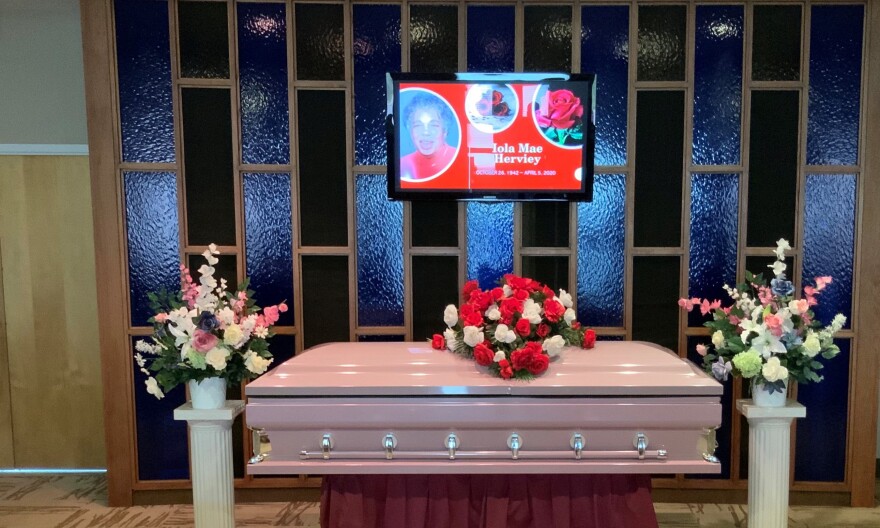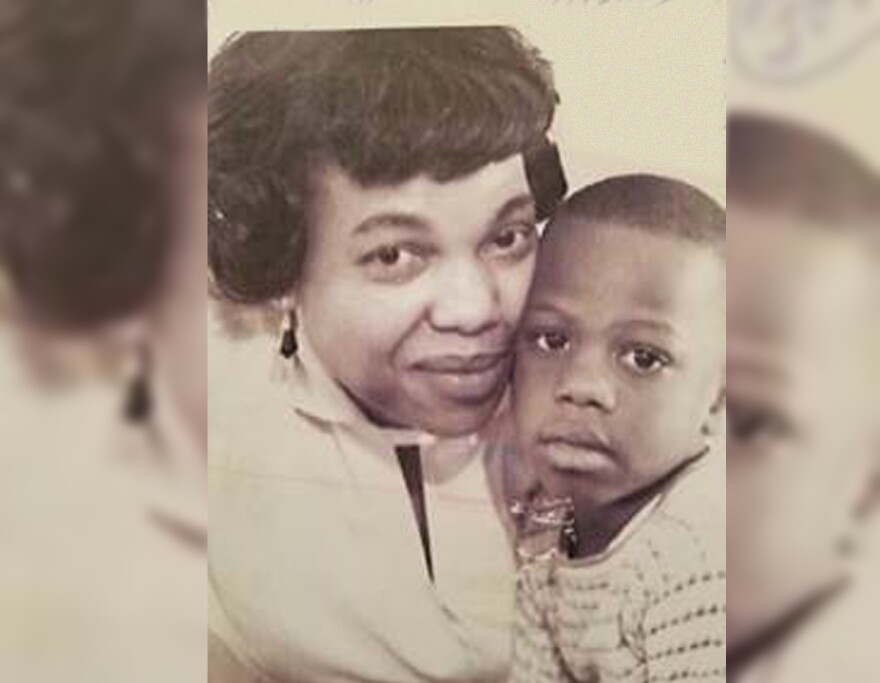Iola Mae Herviey loved her nine children with such a fierce protectiveness her kids felt sorry for anyone who got in their way.
Herviey was strict, determined to make them into good kids. Her youngest, Darryll Fortune, had heard all the stories, of course. But something dawned on him about three-quarters into the April funeral for “Moma,” as he and 20 others watched her Zoom service from their respective homes, spread around the country.
“Wait a minute! Why is everybody talking about my Moma whooping ass?” he said. “I mean, everybody talked about her spanking and cussing folks out and it's like, wait! And we just all bust up laughing.”
“They said, ‘Well, your Moma didn't play.”
Iola Mae (Robinson) Herviey graduated from high school during World War II and raised nine children in Kansas City, Kansas, on her wages as a domestic worker. A life-long Christian, she buried four sons, three husbands and two siblings. She smoked unfiltered Pall Malls for years, telling her kids to eat their greens and drink water and they’d be fine. She never even had a surgery until she was in her mid-80s.
“It took corona to take her out,” Fortune said.
Herviey died April 5 at Providence Medical Center after contracting the coronavirus at Riverbend Post Acute Rehabilitation, the Kansas City, Kansas, facility where 36 others died, the most of any nursing home in the state. She was 93 years old.

Part of the Great Migration
Like many in Kansas City, Kansas, Herviey was part of a family who had moved north from Arkansas during the Great Migration, the decades after Reconstruction when millions were lured away from racist Southern life in hopes of good jobs in northern cities. She was born in 1926 and grew up in a proud African-American community, attending Sumner High School, the then-segregated all-Black school, Class of 1944.
Visiting his mother at Riverbend, Fortune said he would walk down the halls and see nameplates on the doors of folks he remembered as a superintendent or a teacher at a school, local business people, names that stood for something in a town everyone called KCK.
There “was a whole community there of people who grew up in Kansas City, Kansas,” Fortune said. “And because they were… didn't have great economics or, poor, I'll put it that way, Riverbend and other similar places was their only option.”
Hard-working, on a daily wage
Herviey was such a hard-worker her son would fight anyone who said otherwise. Her first job as a teenager was at the Monarch Egg Plant. She spent the next decades as a “day keeper,” Fortune said, cleaning house and raising children for two prominent families, including the Cosentino’s, who own grocery store chains in Kansas City.
At her service, the Saturday before Easter Sunday, as Herviey lay in a casket of her favorite pink color, her children remembered the woman they called Moma. She was old-school: tough and tender, strict and selfless – all from a three-bedroom home in the projects.
“I watched this lady raise nine kids – eight boys, one girl -- on the income she had getting paid daily. Not weekly, not bi-weekly, not monthly. Daily. Scrubbing people’s toilets,” said her son, Rene Andre Fortune.
“I had no idea what domestic work was until I was almost grown. When I found out what she was doing, it humbled me so much as a person to find out what my mother was doing to put clothes on our backs, to put food on the table. To provide the right thing and the right way.”

When the kids were done with their chores around the house, Moma had to inspect the job before they were allowed to go out and play. But weekends? Weekends were great at Moma’s house, with Friday night starting out with a dinner of fish, white bread and spaghetti. Then friends and family came over to play cards, drink Hamm’s beer and dance to Motown records. On Saturday morning, the treat was donuts from the Cake Box Bakery, and Sunday was always church.
If you were wrong, she told you so
Herviey was a great cook with an infectious laugh, said the Rev. Ronald King, Herviey’s nephew and pastor of Mason Memorial Methodist Church in Kansas City, Kansas. She was friendly, he said, but didn’t mind telling anyone if they were wrong, they were wrong.
“She also had a profound belief in karma, or whatever it is the world deals you back when you don’t do what you’re supposed to do and you don’t listen to the wisdom of the ages,” King said.
“I remember once she told (sons) Reggie and Jerry not to do something,” King said. “And then they thought they was grown and they went ahead and started to do it anyway and Auntie looked at me and said, ‘You see, Ronnie, that boy don’t believe fat meat’s greasy.”
Another son, Ricky Herviey, remembered one of his mother’s friends bugging him at their home when he was about 15-years-old. She sent her son out of the house, but Ricky Herviey listened from outside.
“I could hear her going off on the lady and it wasn’t pretty,” he said. "Mom was very nice in her own way, but when you start messing with her kids, it was a whole different ball game.”
Don’t call her a single mom
After her kids were raised and she retired, Herviey loved to travel, visiting family in California and taking the occasional cruise. When she wanted to work again, she got a volunteer job at Grant Elementary School as a grandparent helper, but her discipline was too strong for the school district, Darryll Fortune said.
“She wouldn't say she got fired, but she got fired,” Fortune said with a laugh. “She was telling the kids, ‘Hey boy, get over here. You can't do that now, sit your ass down.’ (Administrators said,) ‘Miss Fortune, you can't talk to the kids that way.’ And she said, ‘What? That's the problem. Now the parents just let them run around here.’”
She also scoffed at the term “single mother.”
“Her thing was, ‘What the hell does that mean?” Fortune said. “’You're a mom, you know, whether there there's a man in your life or not, and once your baby comes out of you, you're a mom.’”
Darryll Fortune said he often asked his Moma why her family moved up from Arkansas, and she would say, “Oh, hell, boy. Why are you even asking me about that?” She simply said that her family wanted a better life, he said.
Which is what she wanted for her kids, too.
“She'd say, you know, I only had a high school education, but you all should do better. Go to the military or go to college, but do better than I did,” Fortune recalled.
Her kids wondered why Moma didn’t want a better house or cars or a 401K, but she told them she was happy.
“Her response is: I got my kids. I got my health,” Fortune said. “I got my family.”
Iola Mae Herviey left behind a large family. In addition to her nine children and two nephews, she has dozens of grandchildren, great grandchildren and several great-great grandchildren.
Kansas News Service's Celia Llopis-Jepsen contributed to this report.





